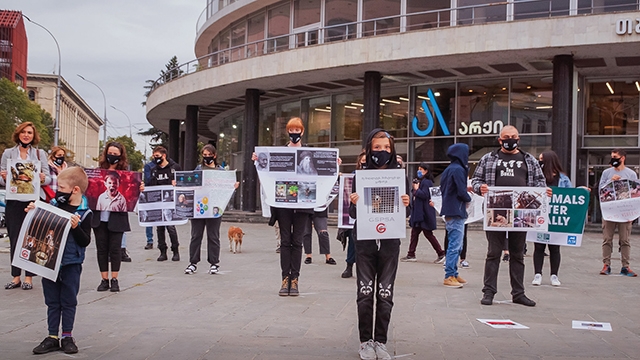Be Their Voice - How World Animal Day was Celebrated in Georgia
The Georgian version of this article was originally published on On.ge
On October 4, on World Animal Day, dozens of people gathered near Tbilisi Concert Hall to advocate the ethical treatment of animals. "Stand up for animal rights!" was the slogan of the rally.
Why is the celebration of this day important? What is the animal rights situation in Georgia? And what should be done to achieve species equality? These were the talking points of the participants.
The event was organized by the Georgian Society for the Protection and Safety of Animals (GSPSA), together with animal rights activists, and was supported by the world's largest animal rights organization, PETA.
Animal rights is the idea that all animals are entitled to the right to exist, and that their natural need to avoid suffering and death should be granted the same consideration as the analogous interests of human beings.
The idea of World Animal Day was originated by German writer and publisher Heinrich Zimmermann, who organized the first such day on March 24, 1925, in Berlin, and fought for there to be subsequent such days.
Since 1929, animal rights activists have been celebrating World Animal Day on October 4. Initially, October 4 was only celebrated in Germany, Austria, Switzerland and Czechoslovakia. Finally, in May 1931, at the International Animal Protection Congress in Florence, Italy, the proposal to make October 4 the official World Animal Day was unanimously accepted and adopted as a resolution.
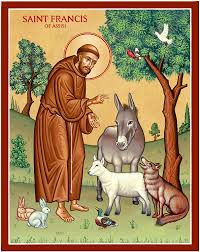
The date is symbolic as it is the day of remembrance of St. Francis of Assisi, patron saint of animals and ecology. A Catholic saint and founder of the Franciscan Order, St. Francis was said to have been able to speak to animals, and died on this day.
This year, on October 4, despite the pandemic, Georgian animal lovers united around the idea of what is called “species equality.” The placards of the participants had a thematic inscription - "Be their voice! Speak up for those who can't”.
Teimuraz Tsikoridze, the co-organizer of the rally, GSPSA chairman and October 4 Ambassador to Georgia, said: “World Animal Day is a paramount event in terms of animal rights, and is celebrated in many countries, including those where the government pursues the right vision, and where peoples’ self-awareness is high.”
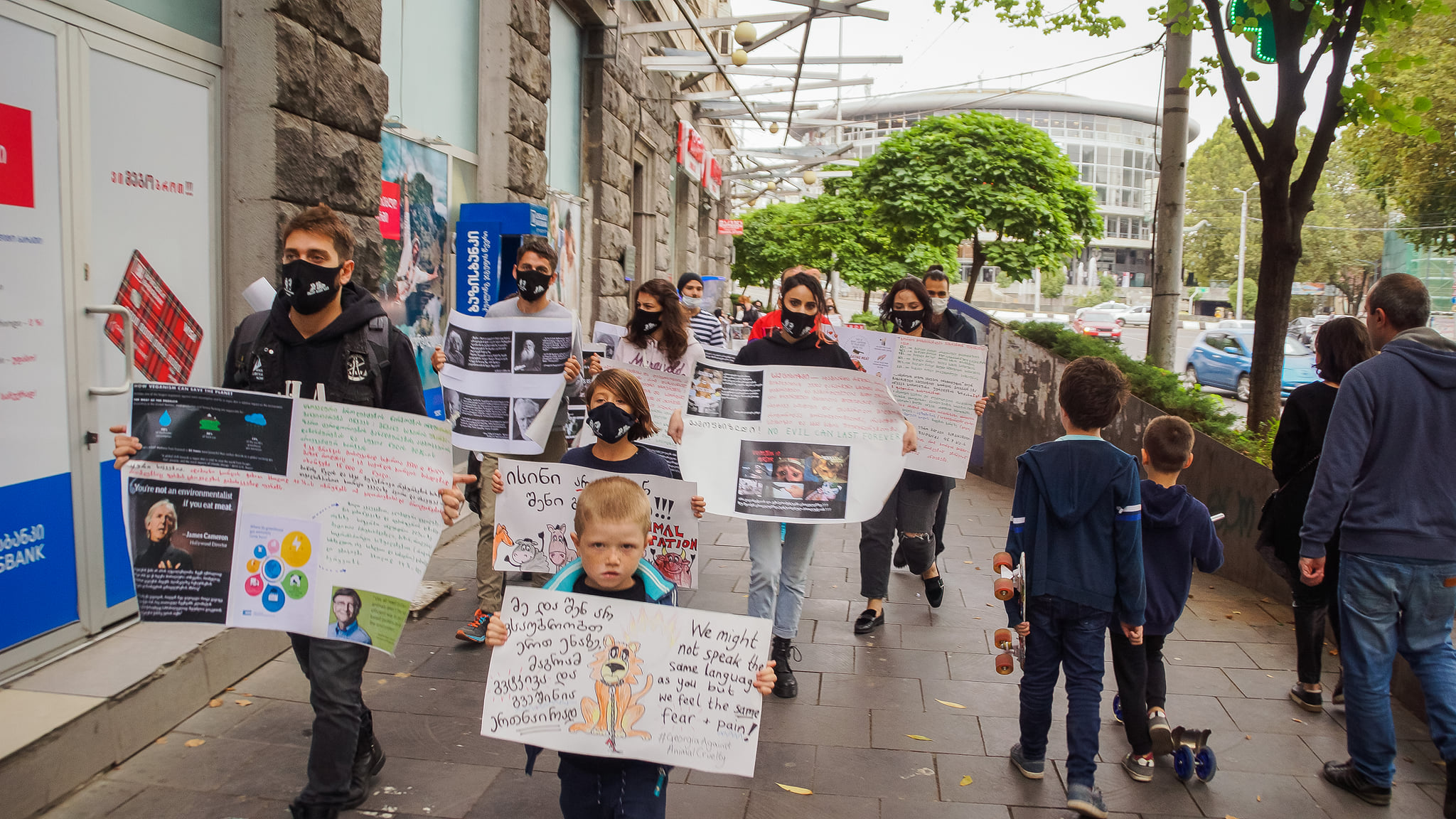
Time to Tackle Speciesism
Animal Rights Defender and activist Lika Batsikadze also spoke of the importance of World Animal Day. For her, the main motivation for participating in the rally was to increase public awareness and to call for effective steps to be taken by the relevant structures.
“Issues related to animal welfare are much more complex than is often assumed. They are closely linked to global challenges, such as the hunger crisis, clean water shortages, violent tendencies in society, zoonotic diseases and even environmental problems,” Batsikadze said. “The mission of the rally is to deliver vital messages to the public through targeted activities, which will help develop an ethical attitude towards other living beings and a better understanding of personal responsibility.
“Unfortunately, around the globe, many animals are being abused and exploited on a daily basis, including in the food, clothing, and cosmetics industries. Also particularly noteworthy is the unjust practice that underlies the use of animals for entertainment purposes. A clear example of this is the zoo, the dolphinarium, the circus performances, and the animal fights,” she added.
Batsikadze has been a vegan for years, opposes all forms of animal exploitation with her way of living, and has led numerous campaigns to protect animal rights in the past. Among them was last year’s campaign #CircusWithoutAnimals, which she said raised public awareness and sparked discussion about the abuse of animals for the sake of entertainment.
“But there is still more to be done. First of all, it is necessary to improve the existing legislation regarding animal welfare, pursuant to international standards,” Batsikadze noted, adding that World Animal day hugely facilitates the mobilization of the relevant agencies, and civil society, to pursue righteous action for a better future for animals.
“If we look at the history of human rights, the pursuit of public good, which is, in part, the result of a struggle against racism, xenophobia, sexism or religious intolerance, has come at the expense of relentless resistance and heightening of public awareness,” she said.

Licensed Killers
Tsikoridze also touched on the problem of legislation, pointing to the lack of awareness in society regarding animal rights. In addition to increasing incidences of cruelty to animals, he said, people do not sufficiently consider how bad the ordeal is for many animals.
“We have filed and published several petitions, none of which have been responded to by the authorities. The law enforcement agencies often do not respond to incidents of animal cruelty, although such have become increasingly common,” Tsikoridze told us.
He also addressed the question of hunting.
“There are more than 100,000 official hunters in Georgia, and up to 300,000 poachers. Although some try to differentiate between the two, these two concepts for me are one and the same,” he said.
“In the 21st century, hunting is more akin to a blood sport. In the past, the activity was justified by a person’s need to support himself and his family. Back then, many likely had no other option. I think the current need to kill animals and birds mercilessly stems from acute psychological problems and is something of a sick tendency. People enjoy killing the living, and are only punished if the slaughtered animal is on the Red List. Animals, regardless of species, enjoy and deserve life, just as we do.”
“Around the world, especially in Europe, the number of vegans is increasing. I believe that for the world to be considered civilized, it is imperative that the number of vegans should greatly exceed the number of people who eat animal products. The consumption of animal products is directly related to murder and cruelty. When a person eats meat, obviously, he is participating in a cruel chain called the exploitation of living beings,” Tsikoridze stated.
“On many farms, the animals are artificially bred and then slaughtered. No matter how 'humanely’ we kill the animals, it can never be justified. They spend virtually their entire lives, if we may call such existence a life, in captivity, and then are killed to be eaten by us. Although this action is allowed by law, we are obviously against it,” he added.
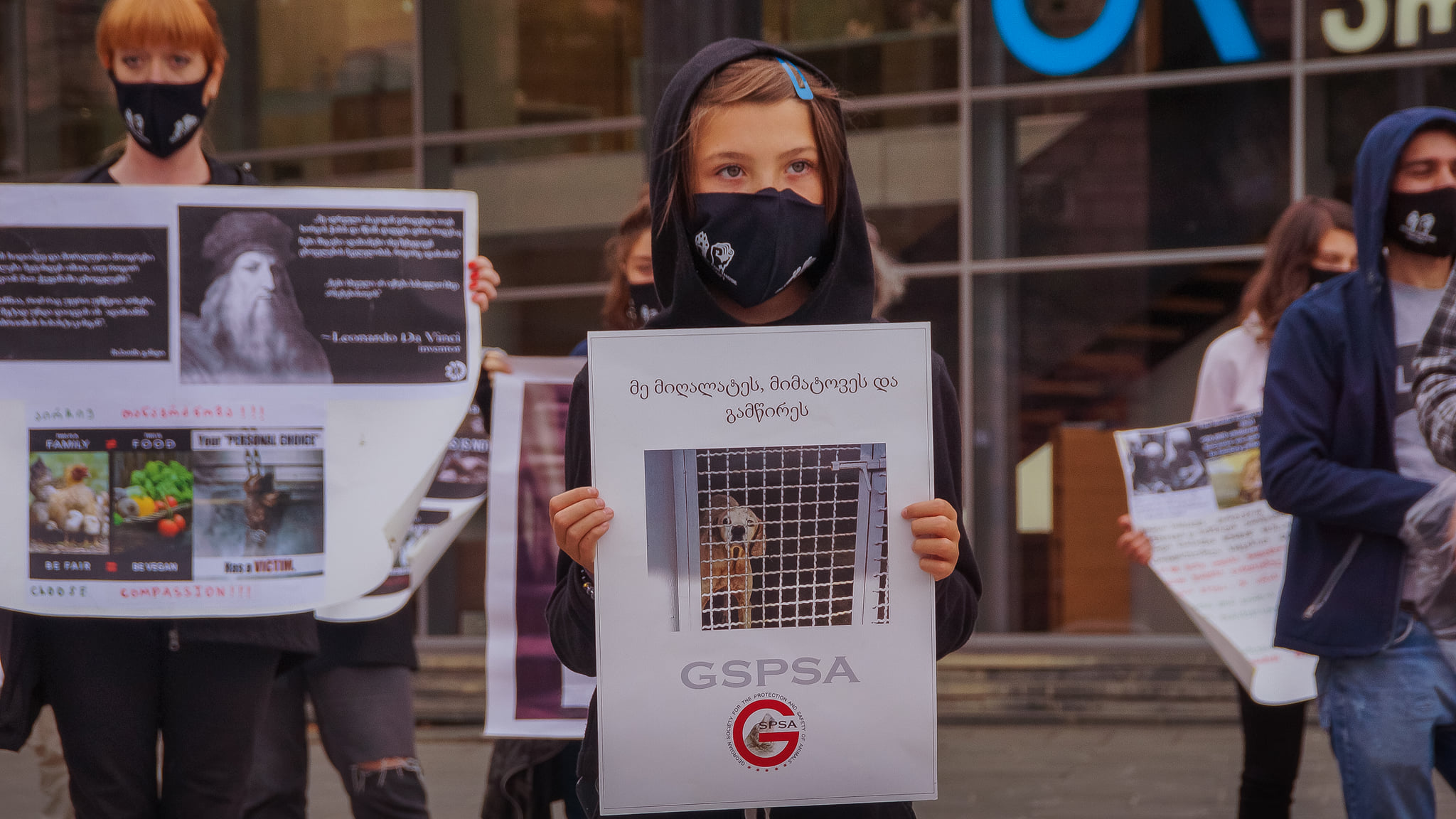
Animals have the right to exist beside us
English writer and journalist Katie Ruth Davies attended the rally with her three children. She has lived and worked in Georgia for more than a decade, and a few years ago, the writer, who loves Georgian traditions and feasting, chose to go vegan. She left her children free to choose to do the same or not, and all three opted for vegetarianism, including the youngest, 6-year-old Toran, who, along with his sisters, also protests the cruelties committed against animals at every rally.
“Me and my kids have always loved animals, and we have quite a few at home- chickens, ducks and turkeys rescued from factories or markets, street cats we feed, hedgehogs and tortoises which appear and disappear in our garden every year,” Davies tells us. “Too many people see animals as possessions, as something they own (and so have a right to control), or as something they can use for food, clothing, testing pharmaceuticals and cosmetics on, or to hunt. I believe animals, as sentient beings, have the right to exist alongside us, not “under” us. In developed countries, and this includes Georgia, we don’t need to eat meat. We don’t need fur for clothing. Hunting is a cruel sport and not a necessity. In the 21st century, we have learned to create synthetic products to use for clothing instead of leather and fur, and learned (or re-learned) to use natural, plant-based ingredients for food, medicines and cosmetics. We should understand that animals feel love, pain and fear just as we do, and just because they don’t speak the same language as us to be able to tell us, we should be smart enough to recognize it and respect them as fellow beings. That’s why my family joined the animal rights activists on October 4 to ‘Speak for the Voiceless’ and stand up for animal rights.”
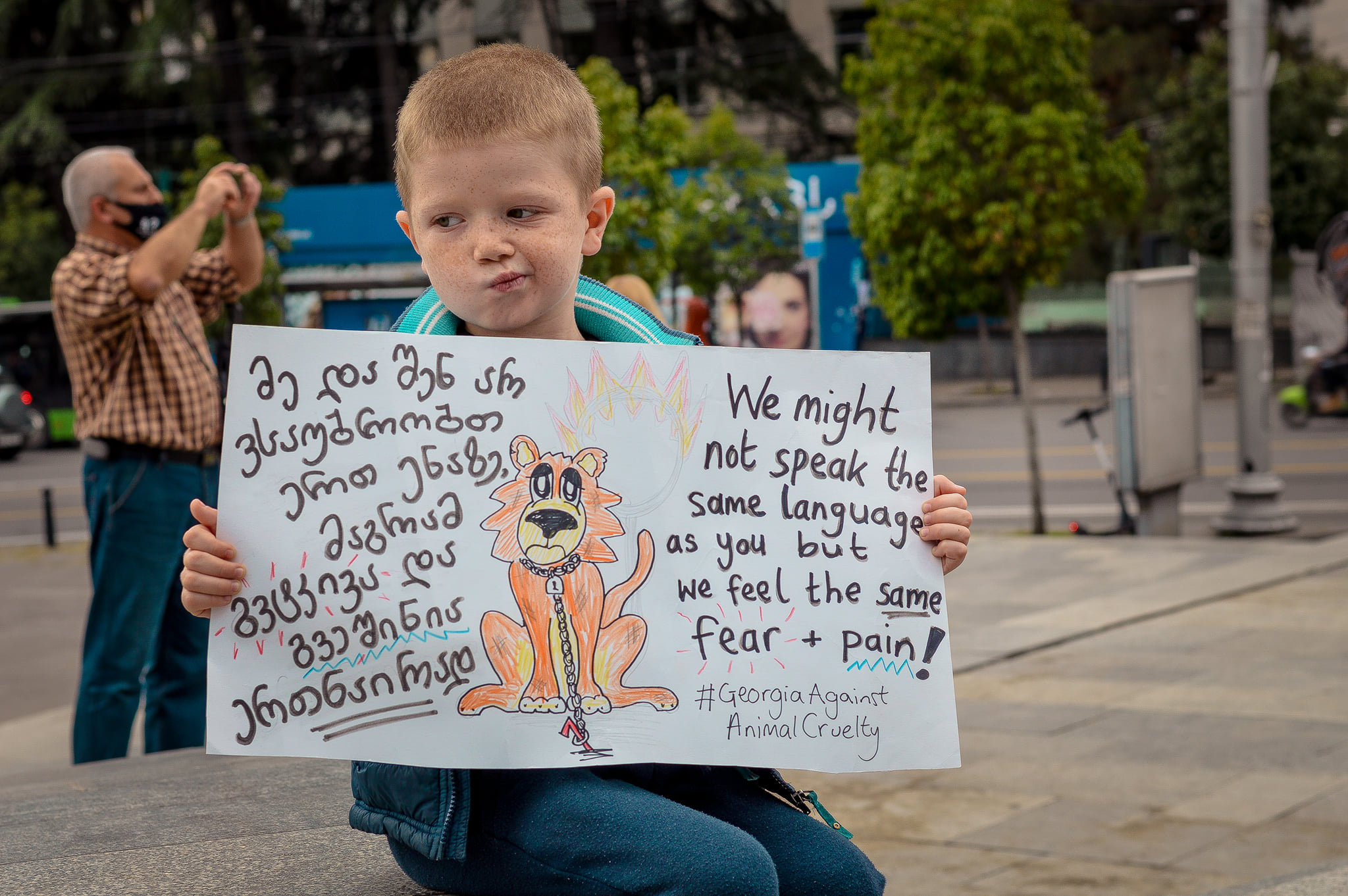
Georgia’s animal rights through the eyes of a foreigner
“I’m forever an optimist and I always say Georgia takes 'two steps forward, one step back'- but it IS moving forward, however slowly," Davies says. "Of course, this year especially, people have been hard hit by the impacts of corona, either directly through illness or losing loved ones, or in work and income losses, my family among them,” Davies says. “This means that messages in support of animals often meet a certain level of animosity, with comments like ‘with people starving, what time is this to care for animals?’ I believe it’s a time to care for every living being around us. To care for our environment. To make this world a better, healthier, brighter place. I’m vegan and my kids are vegetarian, and giving up meat has saved us money and made us lighter and healthier: we're packing a lot more vegetables, fruit and legumes into our diets these days, and the knowledge that we’re not causing harm to animals by supporting the meat industry, and that we’re having even a tiny impact on the environment by reducing the amount of deforestation that’s going to be needed, is a huge boost to our morale and positivity.
“Back to Georgia, I think it has a long way to go to recognizing equal rights for all animals. The focus tends to be put on domestic animals, which is limited mostly to cats and dogs, while all animals, including pigs, bears, chickens, rabbits, and birds, deserve to live long, healthy lives which are as free and natural as possible.
As Davies points out, education is key to improving the status of animal rights, and all animal rights activists agree on this. Tsikoridze says that “no law can save us if we do not raise awareness.”
Batsikadze also emphasizes the importance of raising awareness, saying that while activism may be linked to disappointment, the fight always makes sense, and “it should be understood by all human rights activists, because ideological change requires the most effort.”
It is clear that it really makes sense to fight to protect the vulnerable. In recent years, many countries around the world have taken effective steps to improve the lives of animals. France has recently joined the dozens of countries where participation in animal circus performances is banned. States are actively seeking to regulate their legislation in this regard and to promote species equality. We can only hope that Georgia will appear among them soon.
By Giorgi Muzashvili for on.ge, translated by Ana Dumbadze & Elene Dzebisashvili
